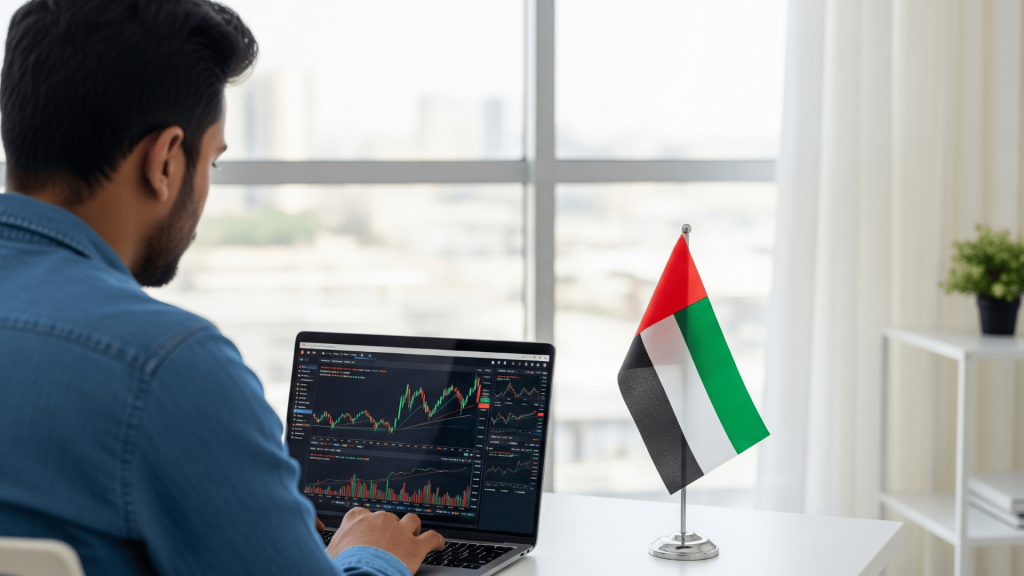A trading account is an investment account that enables individuals or entities to buy and sell securities such as stocks, bonds, commodities, and derivatives on financial markets. It serves as the gateway for executing trades, holding cash, and managing investment assets.
Typically, trading accounts are opened with licensed brokerage firms or banks, providing access to online platforms for seamless transactions and portfolio management.
Why Open a Trading Account in the UAE?
The UAE, particularly Dubai, has rapidly become a global financial hub, attracting investors due to its:
1. Zero income and capital gains tax: Individuals and companies enjoy a tax-free environment on trading profits, maximizing returns.
2. Diverse and stable economy: The UAE’s economic diversification, beyond oil, into finance, tourism, and trade, creates a reliable trading environment.
3. Access to global and regional markets: With two major exchanges, the Dubai Financial Market (DFM) and Nasdaq Dubai, investors can trade both local and international securities.
4. Ease of doing business: Streamlined regulations, transparent laws, and government support make opening and operating accounts straightforward.
5. Strategic geographic location: The UAE’s time zone overlaps with both Asian and European markets, extending trading opportunities.
Robust infrastructure and investor protection: Advanced digital platforms and strong regulatory oversight ensure safety and efficiency.
Documents You Need to Start
Opening a trading account in the UAE requires some standard paperwork. Most platforms follow similar steps and checks.
These documents are usually needed:
- Valid passport copy
- Emirates ID (for residents)
- Proof of UAE residence (e.g., utility bill or tenancy contract)
- Bank account details
- National Investor Number (NIN)
- Completed account opening forms
Additional documents may be needed for businesses or non-residents, such as shareholder agreements or trade licenses. Always check with your chosen platform.
Types of Trading Accounts Available
The UAE offers several account types for investors with different needs. Whether you’re new or experienced, there’s a setup that fits your goals.
These options provide various levels of access, flexibility, and compliance features:
1. Cash Account
A cash account allows you to trade using only the money you deposit. There is no borrowing or leverage involved, which keeps risk low and control high. I
It’s a simple and clear way to start investing, especially for those who are new and want to avoid debt or interest charges.
2. Margin Account
A margin account lets you borrow funds from your broker to increase the size of your trades. This can multiply gains, but also magnifies losses.
It’s best suited for experienced traders who understand how leverage works and can handle quick market changes without panicking.
3. Standard/Individual Account
This account is set up for one person and gives full control over trades and funds. It’s the most common choice for retail investors and works well for anyone starting out.
It allows access to a wide range of assets and platforms, depending on your broker or bank.
4. Joint Account
A joint account is shared between two or more people. All account holders can access and manage trades equally, making it ideal for family members or business partners.
Decisions are usually made together, and profits or losses are split based on agreed terms.
5. Corporate Account
Businesses and institutions use corporate accounts to manage large-scale investments. These accounts often come with added services like trading reports, tax tools, and multi-user access.
You’ll need business registration documents and sometimes board approval to open this type of account.
6. Islamic/Shariah-Compliant Account
This account type follows Islamic finance rules. It avoids interest (riba) and bans trading in restricted industries like alcohol or gambling.
It’s designed for Muslim investors who want to trade while staying within their religious beliefs, and it’s widely offered in the UAE.
7. Demo Account
A demo account lets you practice trading without using real money. It’s perfect for beginners who want to learn how trading platforms work, try out strategies, or test new ideas in a risk-free setting before putting actual funds at stake.
8. Specialized Accounts
Specialized accounts are designed for specific markets or asset types like forex, futures, or commodities. These often include access to advanced tools, faster execution, or tighter spreads.
Traders who focus on one area may benefit from these custom account setups.
Top UAE Banks Offering Trading Accounts
Many UAE banks offer strong trading options along with solid security and customer service. Here’s a quick comparison:
| BANK NAME | SPECIALIZATION/STRENGTHS |
|---|---|
| Emirates NBD | Full-service trading and investment options, local expertise |
| Abu Dhabi Commercial Bank | Multi-currency, digital access, and Islamic banking options |
| Dubai Islamic Bank | Shariah-compliant accounts are strong for expats |
| First Abu Dhabi Bank (FAB) | Business and investment accounts, digital tools |
| HSBC Middle East | Comprehensive investment services, global reach |
These banks either have their own platforms or work with licensed brokers for direct market access. They also offer investor support and secure portals.
Steps to Open a Trading Account in the UAE
Getting started with trading in the UAE is simple if you follow each step in the right order. This detailed list explains everything you need to know and do, ensuring that nothing is missed and your account is ready without delay.
By preparing ahead, you avoid common mistakes and set yourself up for smooth trading in a regulated market.
- Define your goals and research: Clarify what you want to achieve and how much risk you can handle.
- Choose a licensed broker or bank: Make sure your provider is approved by the UAE’s Securities and Commodities Authority (SCA).
- Apply for a National Investor Number (NIN): Needed for UAE market access. Apply through DFM or a broker.
- Submit the required documents: Provide ID, residence proof, and any extra documents if needed.
- Complete account opening forms: Fill out all forms, including KYC and risk agreement.
- Fund your account: Transfer the starting amount using accepted payment methods.
- Access trading platform: Log in, set up preferences, and explore tools.
- Monitor and manage your portfolio: Use the platform to trade, track, and plan ahead.
By following these steps, you’re more likely to build a strong, well-managed trading account in the UAE. It’s not just about opening an account; it’s about being ready to trade smart.
Confused about which trading account suits your needs? Our experienced consultants will assess your trading style, explain different account types, and guide you through the entire setup process. Schedule your consultation now!
Common Mistakes to Avoid
Many new traders in the UAE rush into the market without preparing properly. These errors can lead to losses, stress, and missed chances.
Knowing what not to do is just as important as learning how to trade. Avoid these common mistakes:
- Trading without a clear strategy
- Poor risk management (like overleveraging)
- Letting emotions drive trades
- Trading too often
- Skipping research
- Ignoring fees or currency costs
- Using unlicensed brokers
Staying disciplined, informed, and cautious helps protect your funds and build long-term growth. Always double-check sources and review decisions before making trades.
Final Thoughts
The UAE makes it simple and secure to open a trading account with access to both local and global markets. With the right platform, clear goals, and proper documents, investors can start confidently.
Avoiding common errors and using trusted brokers or banks will help you make the most of what the UAE’s market offers.
Frequently Asked Questions
What Is a Trading Account vs. a Demat Account?
A trading account is used to buy and sell shares on the stock market. A Demat account holds those shares in digital form after you buy them. You place trades through the trading account, and the shares are stored or removed through the Demat account. Both accounts work together during the entire trade process.
Do I Need Both a Demat and a Trading Account?
Yes, you need both. The trading account lets you buy and sell, while the Demat account stores your stocks electronically. Even though they are often mentioned together, they serve different roles. You trade through one and hold through the other.
Can I Start Trading Without a Demat Account?
No, you can’t. A Demat account is required to complete most trades, especially if you’re dealing with stocks. If your intraday trades aren’t closed, they must be settled using a Demat account. It’s also needed for physical settlement in stock F&O contracts.


